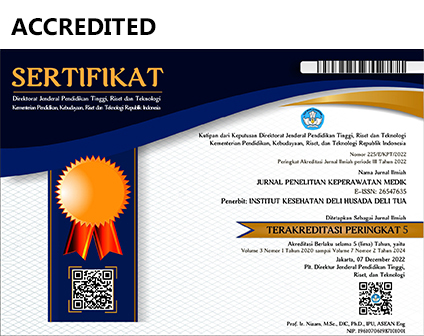Perilaku Ibu Dalam Pencegahan Penyakit Demam Berdarah Dengue (DBD) Pada Balita Di Kelurahan Belawan Bahagia Kecamatan Medan Belawan
Abstract
Dengue Hemorrhagic Fever (DHF) is a disease that is still the center of attention because the number of cases is increasing in number of cases in children under five. Some of the factors that are thought to influence are behavioral factors in the form of behavioral domains, namely knowledge, attitudes and practices in the implementation of prevention for housewives and their families. The purpose of this study was to identify the relationship between maternal knowledge and attitudes in the prevention of Dengue Hemorrhagic Fever (DHF) in toddlers. This type of research uses the type of research that is analytic observation with a cross sectional research design. The total sampling used in this study were 32 mothers who had children under five in Sido Rukun village who had toddlers. The data measurement technique was carried out by the researcher using a closed questionnaire to the respondents as many as 24 questions, namely, 12 questions for Independent Variables and 12 questions for Dependent Variable questions. The results showed that out of 32 mothers who became respondents, it was shown that the knowledge of mothers about Dengue Hemorrhagic Fever (DHF) was still quite good, namely 18 respondents (56.3%). Based on the attitude of the results found by the researcher, the majority of 32 mothers who had toddlers had good attitudes as many as 19 respondents (59.4%). The results of the analysis by researchers that have been carried out show that there is a relationship between maternal knowledge and attitudes in the prevention of dengue hemorrhagic fever (DHF), this can be seen from statistical tests using SPSS using the dhisquare test, analysis p = 0.03 means p <0.05 the results of the distribution and the questionnaire sheets that were distributed to the respondents. The conclusion is that there is a relationship between maternal knowledge in determining maternal attitudes towards the prevention of Dengue Hemorrhagic Fever (DHF) in toddlers.
References
Depkes, R. (2008). Sistem kesehatan nasional. Jakarta: Depkes RI.
Dinkes Provinsi Aceh. (2009). Profil kesehatan provinsi Aceh.
Gubler, D. (2002). Epidemic dengue/dengue hemorrhagic fever as a public health, social and economic problem in the 21st century. Trends in Microbiology , 10 (2).
Hendarwanto. Buku Ajar Ilmu Penyakit Dalam Jilid I. Balai Penerbit FK-UI, Jakarta 1999: 417-18.
Hairil F et.al,. (3002). A Knowledge, Attitude and Practices (KAP) Study on Dengue among Selected Rural Communities in the Kuala Kangsar District. Pacific Journal of Public Health , 37 - 43.
Hassan, dkk., Buku Kuliah 2 Ilmu Kesehatan Anak. Infomedika, Jakarta, 607-08.
Indan Entjang. Ilmu Kesehatan Masyarakat. PT.Citra Aditya Bakti, Bandung.2000: 20-8.
Itrat, A., Khan, A., Javaid, S., Kamal, H., Javed, S., Saira, k., et al. (2008). Knowledge, Awarness and Practices Regarding Dengue Fever among the Adult Population of Dengue Hit Cosmopolitan. Plos One .
Koendraat, C. J., Tuiten, W., Sithiprasasna, R., Kijchalao, U., Jones, J. W., & Scott, T. w. (2006). Dengue knowledge and practices and their impact on Aedes Aegypti populations in Khampaeng Phet, Thailand. American Journal Tropical Medicine and Hygine .
Krianto, T. (2009). Tidak semua anak sekolah mengerti Demam Berdarah. Makara Kesehatan .
Kubik, K., Blackwell, L., & Heit, M. (2004). Does socioeconomic status explain racial differences in urinary incontinence knowledge. American journal Obsetri Gynecology .
Lwanga, S. K., & Lemeshow, S. (1991). Sample Size Determination in Health Studies. Geneva: World Health Organization.
McArthur, L., Pena, M., & Holbert, D. (2001). Effect of socioeconomic status on the obesity knowledge on adolesence from six Latin American cities. International Journal Obesity Relate Metabolism Diseases
Perez-Guerra, C. L., Seda, H., Garcia-Rivera, E. J., & Clark, G. G. (2005). Knowledge and attitudes in Puerto Rico concerning dengue prevention. Pan American Journal of Public Health , 17 (4), 243- 253.
Potvin, L., Richard, L., & Edwards, D. (2000). Knowledge on Cardiovascular disease risk factors among the Canadian population: Relationship with indicators of socioeconomic status. Cmaj .
Purwanto Heri. Pengantar Perilaku Manusia untuk Keperawatan, Penerbit Buku Kedokteran, Jakarta, 1999:12-115.
Rosdiana. (2010, September 1). Hubungan Pengetahuan, Sikap dan Perilaku dengan Pelaksanaan Pemberantasan Sarang Nyamuk Desa Loa Janan Ulu. Kutai Kertanegara, Kalimantan Timur, Indonesia.
Sri Rezeki H.Hadinegoro, et al. Demam Berdarah Dengue Naskah Lengkap. Balai Penerbit FK-UI, Jakarta, 1998:1-27.
Sigarlaki, Herke J.O. Metodologi Penelitian Kedokteran dan Kesehatan. CV Info Medika Jakarta. 2003:55-173.
Soedarmo, Sumarmo Sunaryo Porwo. Demam Berdarah Dengue Pada Anak, Penerbit Universitas Indonesia, Jakarta.1988:1.
Sistem Surveilans Demam Berdarah Dengue (DBD) Berbasis Komputer untuk Perencanaan, Pencegahan dan Pemberantasan DBD di Kota Semarang Inovasi Online-Vol.4/XVII/Agustus 2005-kesehatan. 2005.
Soekidjo Notoatmodjo, Metode Penelitian Kesehatan Edisi Revisi. Penerbit Rineka Cipta, Jakarta, 2005:80-95.
Suzuki, A., Hyunh, T., Tsunoda, T., Luu, L., kawada, H., & Takagi, M. (2009). effect of existing practices on reducing aedes Aegypti pre-adults in key breeding containers in Ho Chi Minh city, Vietnam. American Journal tropical medicine Hygiene .
Widodo Darmowandowo. Demam Berdarah Dengue. Lab/SMF Ilmu Kesehatan Anak, FK.Unair/RSUD Dr. Soetomo. Jumat, 4 Januari 2002.
WHO. (1999). The incidence of dengue haemorrhagic fever.








